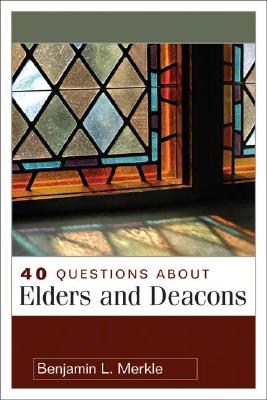Benjamin L. Merkle, 40 Questions About Elders and Deacons (40 Questions and Answers Series). Kregel Academic and Professional, 2007.
- Prequel: Merkle, The Elder and Overseer (2003)
- Sequel: Merkle, Why Elders (2009)
Referenced in: Plural-Elder Church Leadership
LifeandLeadership.com Summary
This stems from Merkle’s doctoral research that culminated in the scholarly work, The Elder and Overseer (2003). It also emerges out of Merkle’s experience as an intern at a church led by a plurality of elders, whom he observed and came to respect highly for their work. His experience moved him to investigate the scriptures for a biblical pattern on church polity, which led to the belief that the terms for elder and overseer in the New Testament refer to the same role, that they indeed designate an “office” and not just a function, and that congregations should be led by a plurality of men who serve in that office. This book takes the same conclusions reached in his scholarly work and puts them into a very accessible question-answer format. He also adds a section on deacons and their relationship to elders. Merkle’s later work, Why Elders, is actually a condensed version of 40 Questions designed for wider congregational use, with emphasis on why each church should have elders.
Merkle is a Southern Baptist, and operates from the same philosophy as Mark Dever and Paul Alexander in The Deliberate Church, and Phil Newton, Elders in Congregational Life. The differences are that Dever writes out of practical concerns as the pastor of a large metropolitan church, Newton ties his observations to Baptist polity and denominational history, and Merkle brings his strength of biblical scholarship to bear. Each represents a very conservative, evangelical approach that emphasizes the positional/structural authority of elders. A view of elders that is more participatory, is built on relational authority and moral suasion, and is focused on empowering others for ministry may be found in volumes by Lynn Anderson and Ian Fair.
40 Questions is divided into three parts, with the forty questions divided among them.
Part 1 looks at the issue of church “offices” in general, with a defense of the elder/overseer office and of congregationalism. He compares congregationalism to other forms of government, rejecting the argument that the Jerusalem Council in Acts 15 supports Presbyterian and Episcopal forms. He also entertains the question of whether apostle, prophet, evangelist, and priest are legitimate offices, arguing for the enduring place of only two offices of “elder” and “deacon,” even over against the role of “senior pastor.” This also is interesting in light of the rebirth of interest in the A.P.E.S.T. model of Ephesians 4:11 among missionals (see Frost and Hirsch, The Shaping of Things to Come).
Part 2 goes in depth with the office in four different sections.
- Section 1 overviews the biblical usage of the terms elder (Gk., presbuteros) and overseer (Gk., episkopos), and the role and authority of the office.
- Section 2 explains the qualifications, with special emphasis on “husband of one wife” and “having believing children,” and observations on whether women may serve in the role (he argues negatively).
- Section 3 discusses the importance of a plurality of elders, and how a church may transition into that model. This includes the optimum number of elders, relationships between elders and staff, equality (parity) among elders, decision-making, etc.
- Section 4 addresses the selecting, ordaining, paying, and removing of elders.
Part 3 considers the role of deacons including background, qualifications, role, relationships with elders, and whether woman may serve in the role. It also presents the case for using the titles “elder” and “deacon.”
From the Publisher
Organized around common FAQs, 40 Questions About Elders and Deacons tackles the major questions that pastors, church leaders, and students ask about congregational church government, a topic of significant interest in the church today. It provides readers with a clear analysis of key biblical passages and succinct answers (4-8 pages each). The unique format of the book allows readers to pick and choose what issues are most pertinent to their interests and needs. Thought-provoking discussion questions for each topic make it ideal for either personal or church-wide study.
About the Author
Benjamin L. Merkle is Associate Professor of New Testament and Greek at Southeastern Baptist Theological Seminary and is the author of numerous articles, which have appeared in journals such as JETS, Westminster Theological Journal, Bibliotheca Sacra, and Trinity Journal. He earned his Ph.D. from Southern Baptist Theological Seminary, where he wrote his dissertation on elders and overseers.
***For additional information on this resource, including reviews, click the bookstore links. Check the reference at page top or the links below for resource guides on related topics.***
Other Ministry Resource Guides:
- Elders, Plural-Elder Congregational Leadership
- Elders, Policy Governance Models
- Managing Volunteers
- Ministry Staff, Ministry Teams
- Pastoral Theology
See Resources on Over 100 Areas of Ministry Leadership:


